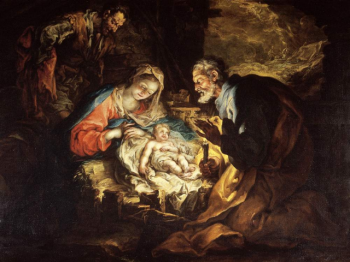To remain fully human. Christmas.

In a recent interview, Iranian writer Azar Nafisi shared a powerful reflection, “the will of history is to love others”. Her book, adapted into an award-winning film at the 2024 Rome Film Festival by Israeli director Eran Riklis, recounts a somber story from the years when I, too, was in Tehran (1983–85). The acclaimed author’s reflection reminds us that we must always “remain human”.
However, here lies the problem: how can we remain human in the face of violence, war, and hatred? How can we remain human in Bucha (Ukraine), Reineh and its surroundings (the site of civilian massacres at the hands of Hamas and its allies), Gaza (where tens of thousands have died in indiscriminate attacks by the Israeli army), in Upper Galilee, Lebanon, Syria, Somalia, or migration zones, even within prisons? And—why not?—even in the most profound and intimate relationships with ourselves, as we grapple with depression or horrific abuses of all kinds, not to mention domestic violence, including that suffered by children and loved ones.
To remain human? Is that even possible without points of reference? To remain human especially at a time like ours in the West, where society is secularized and disoriented, where families lack an ethical or spiritual anchor, where there is an emancipation from religious and even cultural principles, and where artificial intelligence takes the place of our own? For a Christian, “to remain human” cannot be separated from our point of reference, which is Christ, for through His Incarnation, it is God Himself who became fully human. Despite everything, this is the true meaning of Christmas—the event we continue to celebrate amid the splendour of lights and the exchange of gifts.
The Christmas we celebrate is one where God enters and remains human, while opposing all violence, secularism, and inner despair. Without the Christian revelation, it becomes challenging to remain human simply by appealing to the efforts of goodwill.
Charles Péguy, the writer-poet I loved in my youth, said he was struck by the historicity of God—that Jesus, the keystone of history, whom so many today wish to remove, was for Péguy the centerpiece of history, an event through which divine life became inexhaustible history. Indeed, it is not uncommon for the event of Jesus to confront those who wish to sideline Him (like the “brothers” of Joseph, son of Jacob, sold into indifference to passing merchants) or eliminate Him (as Herod tried to do). In the Mystery of the Holy Innocents, Péguy writes that the Incarnation upholds and illuminates everything, for the grace Christ introduces into history through His Incarnation transforms Judgment into the hope of mercy.
Francis of Assisi sought to experience the mystery of the human God by visiting the Holy Land in simplicity and humility, and upon his return to Greccio, he created the Nativity scene—a representation of the purest human essence, a newborn child who needs everything. When a child is born, in the family and in the society, it is truly Christmas. “For to us a child is born, to us a son is given,” prophesied Isaiah (Isaiah 9:5), announcing—amid the pagan sterility and terror instilled by the Aramean warriors of his time—the blessing we receive in Christ. It is there, before a newborn, that we can rediscover the preciousness of what it means to be human; before a newborn, in its purest sense, we become aware and understand how precious life is.
Christ’s Christmas reconciles us and helps us remain fully human, while enabling us to view the events that sadden and shape our world with disenchanted eyes yet without despair. Theologically, God-with-us not only recalls the simplicity and poverty of Bethlehem (now so devoid of pilgrims) but also helps us understand that Christ accompanies us on a journey without prejudice, preconceptions, or barriers.
In the heart of the night, God chose, in Jesus, to become and remain fully human. Here, I would point out that the critical tension between the existential historicity of Jesus, true man, and His being “Other,” true God, is not easily resolved. Jesus’ entire earthly life responds to the doubt raised by many regarding the origins of the Galilean Preacher (“We do not know where this man is from,” John 9:29), culminating in Pilate’s final question: “Where are you from?” (John 19:9). Amid these questions that seek meaning, flows the stream of “words”, no one had ever spoken (“What is this? A new teaching— and with authority,” Mark 1:27) and extraordinary signs for the suffering (“Go and tell John what you have seen and heard: the blind receive their sight, the lame walk, lepers are cleansed, the deaf hear, the dead are raised up,” Luke 7:22), culminating in the sacramental forgiveness of sins.
Only in Christ, who died a human death and then rose again, does everything resolve in the faith that belongs solely to humanity. Faith is granted only to human beings—not to angels, nor to demons. To remain human, then, is possible through faith, for in faith, the human and the divine merge.
One cannot escape the Incarnation, commented Péguy, and thus Christmas always returns.
Fernando Cardinal Filoni
Grand Master
(December 2024)



